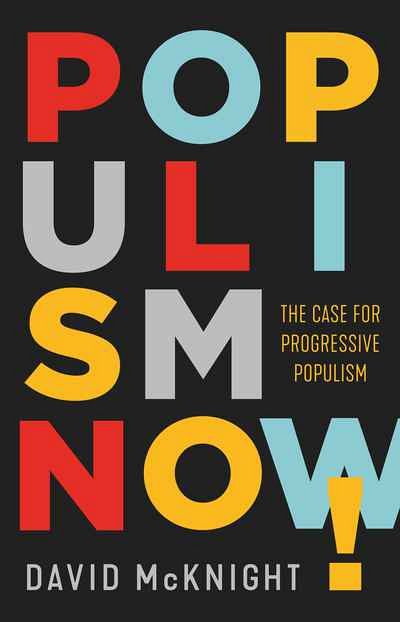In his new book, Populism Now!: The case for progressive populism, Australian journalist and historian David McKnight believes in rescuing populism from the political Right.
His is a progressive version, supporting the economic grievances of ordinary people, not scapegoating migrants and minorities, or not passing judgement on diverse lifestyles and expression.
He sees this practical idealism (my term not his) as neutralising the racism or nativism (xenophobic nationalism) we see around the world, which is still on the fringes here — the right-wing backlash expressed as “border politics” but originating in other issues.
His notion of a campaign centred on interests rather than ideologies is similar to Richard Denniss’ ideas in Quarterly Essay 70, 'Dead Right: How Neoliberalism ate itself and what comes next', that a program which delivers effectively on what people want from government and consistently takes their side is a winner. Denniss says Bill Shorten has that program, financed by closing tax rorts.
McKnight follows the contemporary American author Thomas Frank, who has revived awareness of the progressive populism, which exposed and fought against the robber barons in the U.S. around 120 years ago. This poitics finds its recent echoes in significant support for the Occupy movement and Senator Bernie Sanders' 2016 presidential campaign. But the more centrist Hillary Clinton beat Sanders for the Democratic nomination for president, and the collapse of traditional economic sectors and their local communities became marginal issues in her campaign.
McKnight draws Australian parallels — our long-term and bipartisan policy to give markets a greater role, based on economic arguments, which sound right but need effective regulation by technocrats to make them work. There have been patchy results and a lack of innovation. Perhaps the dominant regulatory approach is “let sleeping dogs lie” — a low aspiration.
"Public choice" theory was influential in economics by the end of the 1970s and regulatory economics informed Australian trade practices and later competition and consumer policy. The dominant ideas aimed towards better economic outcomes from less direct regulation, with market failures funded by governments.
But the Financial Services Royal Commission has shown a permissive and trusting posture is a hopeless model for that industry, with serial offending and the risk of systemic disaster. The electorate are not simpletons and will look to opinion leaders and experts for guidance, so his argument for a front foot intervention will need better models of regulation. I presume McKnight accepts that control, not ownership, is the crucial regulatory variable and doesn’t want to reverse the private-public balance completely.
Is there a case for a progressive populism? Our own @MatteoBonotti reviews 'Populism Now! The Case for Progressive Populism' by David McKnight for @AustBookReview https://t.co/eIqJEsPs7c
— Monash Politics & IR (@MonashPolsIR) August 3, 2018
Much of the book is a prosecution brief against Australian capitalism — its privatisation failures, its preference for fossil fuels over the environment, tax avoidance, the jobs jungle and of course the banks. As well as historians and sociologists, the strength of the argument is evidenced by hard-nosed finance and economic journalists often being the most trenchant critics.
All this might augur well for the cause of progressive populism, but how bitter is the disaffection? We dodged a bullet from the GFC, and the Piketty evidence on the long-term increase of inequality shows the Australian case has been more moderate. Is there enough anger to get people into the streets, or is progressive populism here more likely to be an “influencing” approach?
McKnight sees it as 'a way of seeing the world and a style of arguing for ideas', not harnessed to a theory of history or embodied in a political party but centred around a broad coalition of “people power”. Naturally, he supports the UK's Labour Leader Jeremy Corbyn and the Left parties in Spain and Greece, but it is the reactionary type in other parts of Europe that seem more obvious in Australia.
Who can predict the Australian form of populism? But the growing distance between people and government shown in the 2016 Australian Electoral Study means we can expect a shakeup.
David McKnight, Populism Now!: The case for progressive populism, New South Publishing, 2018
Kevin Bain is an economic analyst and retired teacher, mainly advocating through the Mornington Peninsula Human Rights Group.
 This work is licensed under a Creative Commons Attribution-NonCommercial-NoDerivs 3.0 Australia License
This work is licensed under a Creative Commons Attribution-NonCommercial-NoDerivs 3.0 Australia License
Support independent journalism Subscribe to IA.












